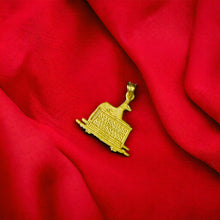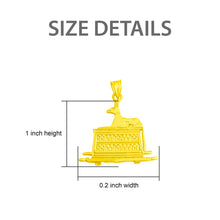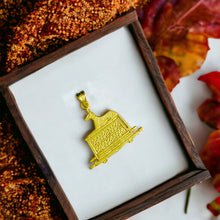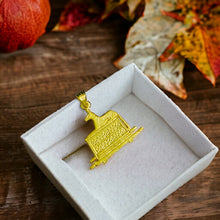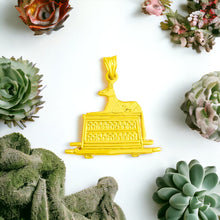God Anubis The guardian Gold Pendant Necklace
- Regular price
- $75.00 USD
- Sale price
- $75.00 USD
- Regular price
-
- Unit price
- /per
Adding product to your cart
The God Anubis Gold Pendant Necklace blends ancient Egyptian mythology with modern craftsmanship, embodying the spirit of Anubis, the ancient god of mummification and the afterlife. Crafted with meticulous detail, it pays homage to Egypt's rich cultural heritage while adding a touch of luxury to contemporary fashion.
- History: Ancient Egyptian deity associated with mummification and the afterlife.
- Spiritually: Represents protection, guide to the underworld, and divine judgment.
- Talisman: Wards off evil, offers guidance, and symbolizes power.
- Handmade: Crafted with intricate detail and care by skilled artisans.
- Healing: Believed to bring spiritual strength and courage.
- Material Gold: Made from genuine gold, signifying purity and value.
- Symbolism: Anubis embodies wisdom, transition, and divine authority.
- How to Wear: Ideal for any chain up to 5mm, perfect for daily wear or special occasions.
History Side For Those Who Are Interested
Anubis, one of the most iconic deities in ancient Egyptian mythology, holds a significant place in the pantheon as the god of mummification and the afterlife. His history intertwines with the cultural and religious practices of ancient Egypt, spanning millennia of worship and belief.
Origins and Mythological Significance: Anubis is often depicted with the head of a jackal or a dog, symbolizing his role as a guardian and guide in the underworld. His appearance as a jackal is deeply rooted in Egyptian religious symbolism, where the jackal was associated with cemeteries and places of burial due to their scavenging nature. This association led to Anubis being considered the protector of graves and the god who oversaw the process of mummification.
In ancient Egyptian mythology, Anubis played a crucial role in the journey of the deceased through the underworld. He was believed to weigh the hearts of the deceased against the feather of Ma'at (the goddess of truth and justice) during the judgment of the soul. This process determined whether the deceased would be granted eternal life in the afterlife or face punishment.
Cultural Evolution: Anubis' prominence grew during the Early Dynastic Period (c. 3100-2686 BCE) and continued throughout ancient Egyptian history. His cult centers were established in various cities, most notably in Memphis, where he was worshipped alongside other major deities like Ptah and Hathor.
During the Middle Kingdom (c. 2055-1650 BCE), Anubis became more widely recognized and his role in the afterlife became even more significant. The rise of Osiris as the primary god associated with the afterlife led to Anubis being positioned as Osiris' son in some myths, while in others he maintained his independent role as the guide of souls.
Religious Practices and Rituals: Priests dedicated to Anubis played a crucial role in ancient Egyptian society, particularly during the process of mummification. They were responsible for performing rituals that ensured the preservation of the deceased person's body and prepared them for the afterlife under Anubis' protection.
Anubis was also invoked in funerary rites and ceremonies, where prayers and offerings were made to ensure the deceased's safe passage and favorable judgment in the underworld. His imagery adorned tombs, sarcophagi, and funerary texts, emphasizing his importance in Egyptian beliefs about death and the afterlife.
Legacy and Modern Interpretations: The worship of Anubis declined with the spread of Christianity and Islam in Egypt, leading to the eventual abandonment of ancient Egyptian religious practices. However, Anubis remains a popular figure in modern popular culture, often depicted in literature, art, and film as a symbol of mystery, death, and the supernatural.
In conclusion, Anubis stands as a testament to the rich and complex religious beliefs of ancient Egypt. His role as the guardian of the dead and the patron of mummification reflects the Egyptians' profound reverence for death and their intricate understanding of the journey to the afterlife.











